rPET Hydrogen Li-Cycle – is rPET the answer to sustainability? Will biofuel damage fossil oil market? 13-07-2023 - Arhive
rPET Hydrogen Li-Cycle
Crude Oil Prices Trend
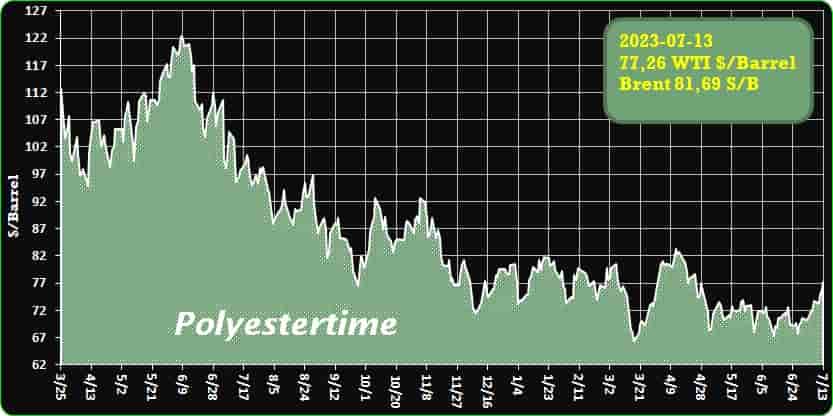
Crude Oil Prices Trend by Polyestertime
Thyssenkrupp Nucera, a hydrogen company, experienced a significant boost in its market capitalization during its initial public offering (IPO) in Frankfurt, Germany
The IPO, which is the largest in Germany this year, raised 445 million euros (USD 487 million) and showcased a positive outlook for Europe’s capital markets. The shares of Thyssenkrupp Nucera surged by as much as 23.4% from their original price of 20 euros and closed at 23.52 euros, resulting in a market value of 2.98 billion euros. The IPO marked a new phase for the joint venture between Thyssenkrupp and De Nora, with Thyssenkrupp retaining a 50.2% stake and De Nora holding 25.9%, down from their previous ownership percentages. rPET Hydrogen Li-Cycle
During the opening ceremony at the Frankfurt Stock Exchange, Nucera’s CEO, Werner Ponikwar, expressed enthusiasm about the IPO and highlighted the company’s commitment to accelerating the adoption of green hydrogen. Unlike other recent European IPOs, Nucera’s shares demonstrated resilience in secondary trading, suggesting a revived investor interest in new offerings after the market volatility of the previous year. The energy transition theme has been prominent in recent European IPOs, exemplified by companies like EuroGroup Laminations in Italy and Hidroelectrica in Romania.
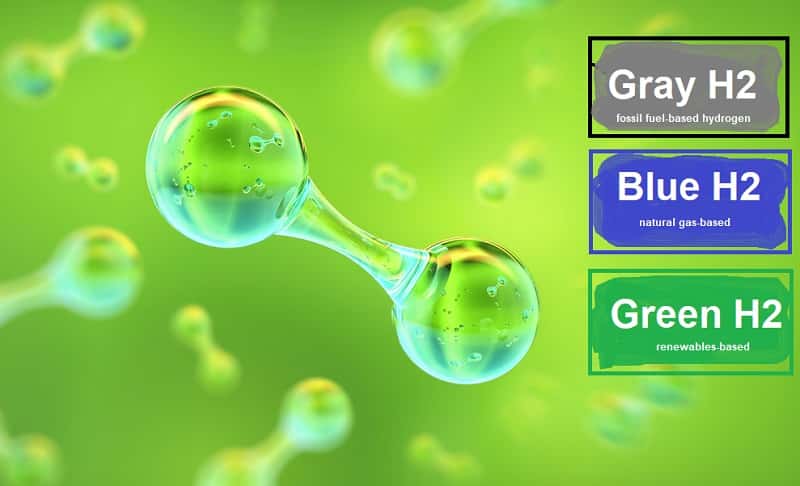
Enrique Ackermann, Vice President of Technical and Innovation at Coca-Cola India and Southwest Asia, recently discussed how Coca-Cola India is taking a leadership role by introducing Kinley bottles made entirely from 100% recycled PET (rPET) plastic
This innovative step represents a significant milestone in India, as it is the first time a food and beverage bottle has been produced using 100% rPET. The new rPET bottles are now available for Coca-Cola’s packaged drinking water brand, Kinley, in 1-liter size.
These bottles proudly feature a label that states, “100% made from recycled food-grade plastic,” highlighting Coca-Cola India’s achievement in advancing its circular economy initiatives. rPET Hydrogen Li-Cycle
The rPET bottles are created using food-grade recycled polyethylene terephthalate (PET), adhering to recycling technologies approved by the US FDA and the European Food Safety Authority (EFSA) for food-grade recycled material. By using rPET bottles, Coca-Cola India is conserving precious natural resources and reducing the amount of plastic waste in the environment.
Enrique Ackermann explained in an exclusive interview with Manufacturing Today that Coca-Cola India’s decision to prioritize the use of 100% rPET bottles for its Kinley brand is in line with the company’s sustainability goals and commitment to creating a “World Without Waste.” The company aims to achieve at least 50% recycled content in its packaging by 2030. This effort aligns with consumer preferences for environmentally friendly packaging solutions and contributes to a more sustainable future.
The process of manufacturing rPET bottles involves recycling PET bottles using approved technologies by the US FDA and EFSA. The recycled PET is transformed into rPET resin, which is then used to manufacture the bottles. The launch of rPET bottles in India only took place after receiving approval from the Food Safety Standards Authority of India (FSSAI), ensuring compliance with food safety guidelines. rPET Hydrogen Li-Cycle
Compared to traditional PET bottles, rPET bottles offer several environmental benefits. They contribute to conserving natural resources by reducing the demand for virgin plastic. Additionally, rPET bottles help reduce plastic waste by incorporating recycled material into the production process, aligning with the Government of India’s “Swachh Bharat Mission” and waste reduction initiatives.
To ensure a reliable supply of rPET for its bottling operations, Coca-Cola India has established partnerships with manufacturing partners. Srichakra Polyplast Pvt. Ltd. supplies food-grade rPET resin, and ALPLA India converts the resin into preforms, the essential raw material for manufacturing rPET bottles. Srichakra Polyplast has developed a robust collection system for used PET bottles, ensuring a consistent and abundant supply of rPET.
Coca-Cola India maintains strict quality control measures to ensure the quality and consistency of the rPET material used in its bottles. Partners undergo thorough technical due diligence, including assessments, audits, and sample testing conducted by third parties and in accordance with FSSAI guidelines and internal standards.
The new Kinley bottles feature a unique label that emphasizes the use of 100% recycled food-grade plastic, serving as a communication tool to convey Coca-Cola India’s sustainability efforts to consumers. The company aims not only to provide sustainable packaging solutions but also to educate and inspire consumers about the importance of recycling and environmental stewardship. rPET Hydrogen Li-Cycle
Regarding future plans, Coca-Cola India is committed to expanding the use of 100% rPET bottles beyond the Kinley brand. The company aims to make all its packaging globally recyclable by 2025 and use at least 50% recyclable materials in its packaging by 2030. Coca-Cola already offers 100% rPET bottles in over 40 markets worldwide.
Coca-Cola India collaborates with recycling and waste management stakeholders to support the circular economy and improve recycling infrastructure in India. Through initiatives like the ‘Return and Recycle’ project with Zepto, the company integrates the circular economy concept into its sustainability commitments and establishes collection systems for recycling empty PET bottles. Additionally, Coca-Cola India works with waste management organizations to enhance the value chain for garbage collection in the country.
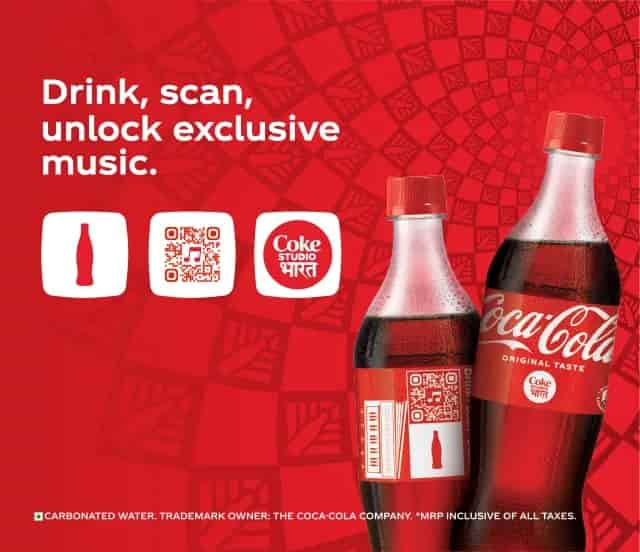
Indian Oil Corporation Limited (IndianOil) and Praj Industries Limited (Praj) have signed a term sheet to establish a joint venture (JV) aimed at bolstering biofuels production capacities in India, as reported by Hydrocarbonprocessing
This collaboration signifies a significant milestone in IndianOil’s transition towards green energy and underscores their commitment to achieving net-zero operational emissions by 2046. By forming a 50:50 JV, both companies aim to strengthen India’s biofuels sector, focusing on various biofuels such as Sustainable Aviation Fuel (SAF), Ethanol, Compressed Bio-Gas (CBG), Biodiesel, and Bio-bitumen.
The availability of abundant feedstock in India’s agrarian economy presents an advantageous opportunity for developing indigenous biofuels, which will not only reduce reliance on crude imports but also contribute to rural economic growth and provide sustainable, cleaner mobility options. rPET Hydrogen Li-Cycle
Praj Industries, a key player in the Indian biofuels industry, emphasizes that biofuels have a positive impact on socio-economic and environmental aspects, enabling sustainable development. The partnership between IndianOil and Praj has previously yielded successful outcomes, including the establishment of India’s first advanced biofuels refinery at IndianOil’s Panipat complex, employing Praj’s proprietary 2 G technology. Furthermore, in May of this year, IndianOil and Praj collaborated with AirAsia India to operate India’s inaugural commercial passenger flight powered by a blend of indigenous Sustainable Aviation Fuel, thereby promoting a greener future and contributing to India’s bioeconomy as a tool for sustainable climate action.
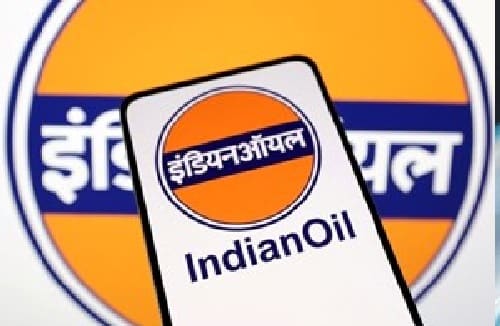
Prices drop 40% for two key recycled plastic grades
Market graph iconPET and HDPE prices have taken a sudden crash this month, dropping by double-digit percentages. Luckily for MRFs, most everything else in the curbside mix is holding steady.
The national average price of post-consumer PET beverage bottles and jars is down 44% this month. Bales of PET are now averaging 7.06 cents per pound, compared with 12.63 cents per pound this time last month.
Some regional PET bale contracts are still yielding as high as 10.00 to 11.00 cents per pound, but the open market is yielding only 2.00 to 4.00 cents per pound. This grade was trading at 37.50 cents one year ago. rPET Hydrogen Li-Cycle
Natural high-density polyethylene (HDPE) from curbside collection programs is down 40%, now at an average 40.94 cents per pound. This compares with 68.75 cents last month and 45.5 cents this time last year.
Following natural’s downward trend, color HDPE dropped 28% this month. This grade is trading for an average 9.31 cents per pound, compared with 12.88 cents last month and 22.03 cents one year ago.
PET, natural HDPE and color HDPE have all been dropping since May, when they hit recent highs. But this month’s decline was much steeper than the May-to-June drop.
Pretty much everything else in the curbside mix is holding steady this month, providing some stability for MRFs’ commodity sales revenue streams.
That being said, pricing lags last year significantly, especially on the fiber side of the equation.
The national average price for corrugated containers (PS 11) is up marginally, now at an average of $49 per ton. That’s $1 more than last month. However, the current price compares with $135 per ton this time last year.
Likewise, mixed paper (PS 54) remains steady at about $14 per ton. This compares with $70 per ton this time last year. rPET Hydrogen Li-Cycle
Sorted residential papers (PS 56) also remain flat this month, at around $25 per ton. This compares with $107 per ton one year ago.
Lastly for fiber, sorted office papers (PS 37) are down again, from $158 in June to $144 per ton this month. This compares with an average $230 one year ago.
The metals are also largely unchanged. The national average price for aluminum cans remains firm at 66.25 cents per pound. It was 74.38 cents per pound this time last year.
Sorted, baled steel cans remain steady at a current average of $226 per ton. The price was $193 per ton one year ago.
Finally, other plastics have been stronger going into summer. Polypropylene (PP) is now trading at 7.56 cents per pound, compared to 7.69 cents last month. PP was 24.94 cents one year ago.
Grade A film remains steady at 17.13 cents per pound. It traded at 22.56 cents one year ago.
Grade B film is also steady at 7.13 cents, compared to 8.19 cents 12 months ago.
Grade C film remains at a nominal 0.19 cents per pound. rPET Hydrogen Li-Cycle
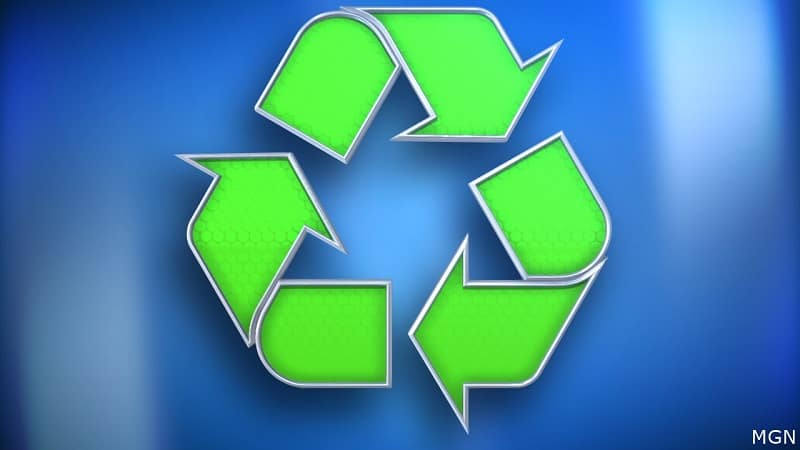
Teijin Frontier Presents Innovative Nonwoven Microcarriers for Rapid and Large-Scale Cell Culture
Teijin Frontier, the fibers and products converting company of the Teijin Group, has unveiled a groundbreaking advancement in the form of nonwoven microcarriers that facilitate speedy, high-capacity, and superior quality cell culture. These microcarriers serve as scaffolding material, providing a conducive environment for a wide range of cell types to adhere and grow in three dimensions. rPET Hydrogen Li-Cycle
The development of these innovative microcarriers combines Teijin Frontier’s proprietary fiber process, nonwoven design technology, and the expertise of Professor Satoshi Fujita from the Department of Frontier Fiber Technology and Science at the University of Fukui in Japan, specialized in fiber-related bio-medical research.
Starting in July, Teijin Frontier will distribute sample shipments of the nonwoven microcarriers to research institutes, universities, pharmaceutical manufacturers, and cosmetics manufacturers. In 2024, the company plans to expand the global marketing of these microcarriers, with a target of achieving JPY 100 million in sales by fiscal year 2026. The unique structure of the nonwoven microcarriers closely resembles the physical environment in which cells naturally proliferate, allowing cells to grow along the fibers in three dimensions. Moreover, the microcarriers facilitate the circulation of essential culture medium and oxygen required for optimal cell growth.rPET Hydrogen Li-Cycle
They are highly versatile and can be effectively utilized for various cell lines, including the cultivation of mesenchymal stem cells, which possess self-renewal and differentiation capabilities. These cells hold significant potential for regenerative medicine, as they can be directed to differentiate into human functional tissues, such as nerves, muscles, and bones.
Cell culture technology plays a pivotal role in the field of regenerative medicine. Conventional cell culture techniques predominantly employ two-dimensional planar technologies, such as culture dishes and T-flasks. However, these methods offer limited cell adhesion areas, requiring numerous dishes to cultivate a small amount of tissue. This results in substantial equipment, personnel, and time investments.
By utilizing cell culture bioreactors capable of culturing a large quantity of cells, efficiency can be significantly improved. rPET Hydrogen Li-Cycle
Microcarriers serve as scaffolding materials in bioreactors, facilitating cell adhesion, proliferation, and differentiation through their mixing capabilities during biochemical reactions. With the diversification of cell lines and culture methods, there is a growing need for new microcarrier types that enable higher-volume and higher-quality cultures, surpassing the conventional bead-shaped microcarriers.
The newly introduced nonwoven microcarriers can be employed in cell culture methods involving fixed bed bioreactors or agitation bioreactors. They exhibit remarkable effectiveness, particularly in bioreactors lacking agitating blades. By combining gentle shaking of the culture with mild shear force, these microcarriers enable the collection of a significant number of cells within a week, without the need to change the culture medium.
One notable advantage of the nonwoven microcarriers lies in their high-porosity structure, offering a substantial surface area for cell culture. This larger surface area allows for the cultivation of more cells compared to traditional scaffolding materials.
Teijin Frontier’s research has demonstrated that these nonwoven microcarriers can increase the number of cells by 30% within a four-day culture period, outperforming conventional bead-type microcarriers. rPET Hydrogen Li-Cycle
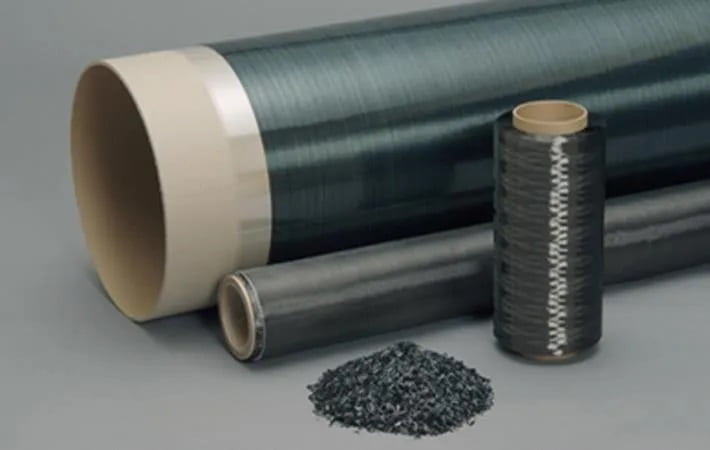
Li-Cycle Holdings Corp., a Toronto-based lithium-ion battery recycler, and EVE Energy Co., a China-based LIB technology company, have entered into a partnership to explore battery recycling solutions
The companies have signed a memorandum of understanding (MOU) to collaborate on the recycling of lithium-ion batteries, specifically focusing on EVE battery materials.
Under the MOU, Li-Cycle and EVE Energy will work together to develop sustainable recycling solutions for EVE LIB materials in the North American market. They will also explore the recycling of battery manufacturing scrap generated at EVE’s planned LIB cell manufacturing facilities in Malaysia and Hungary. The partnership aims to support EVE’s environmental objectives by establishing a closed-loop supply solution and contributing to the global movement towards electrification. rPET Hydrogen Li-Cycle
EVE Energy, a prominent LIB cell manufacturer with global facilities and customers that include major automakers, views expanding its presence in global markets as a key priority. The company plans to construct environmentally friendly battery factories in Europe and Southeast Asia. EVE Energy’s co-founder and CEO, Jianhua Liu, expressed the importance of strategic initiatives such as industry chain integration and international operational models. The partnership with Li-Cycle will facilitate discussions on establishing a high environmental standard battery recycling system to promote sustainable development.
Li-Cycle, recognized as a leading recycling partner, is thrilled to collaborate with EVE Energy. The company’s Executive Chair, Tim Johnston, acknowledges EVE’s status as a proven global leader in LIB cell manufacturing. Li-Cycle’s expertise lies in delivering world-class lithium-ion battery recycling solutions with efficiency, low emissions, and minimal waste generation, contributing to a sustainable battery ecosystem. As Li-Cycle continues to expand its global customer base, the partnership with EVE Energy aligns with its strategic growth plans. rPET Hydrogen Li-Cycle
EVE Energy has not only established a manufacturing presence in Asia but also announced its intention to build its first European battery manufacturing facility in Hungary. This facility aims to supply a major global automaker in the production of electric vehicles. Additionally, EVE Energy plans to construct a LIB cell manufacturing facility in Malaysia.
Li-Cycle’s proprietary “Spoke & Hub” technologies enable safe and environmentally friendly recycling of lithium-ion batteries and battery manufacturing scrap. The process allows for the recovery of crucial battery-grade materials like lithium, nickel, and cobalt. Li-Cycle’s recycling approach boasts an efficient environmental footprint, minimal direct greenhouse gas emissions, and minimal wastewater discharge. rPET Hydrogen Li-Cycle
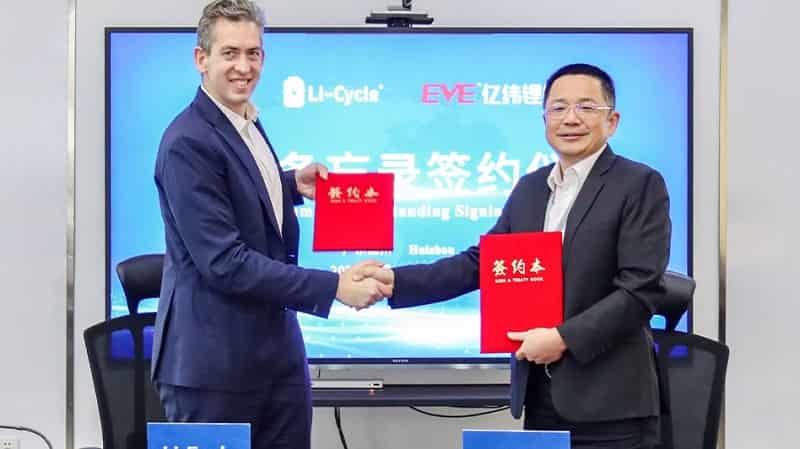
Hybrid prepreg maximizes performance of carbon fiber structures
CAMX 2023: Special Specialty Materials is a supplier of high-quality boron and silicon carbide fiber products, advanced composite materials and high-purity boron nanopowder. The company is a certified, woman-owned small business and won the 2020 National Subcontractor of the Year award from the U.S. Small Business Administration.
Specialty Materials will feature enhancements to its Hy-Bor portfolio of prepregs containing boron and carbon fibers. Hy-Bor is used as selective reinforcement in carbon fiber composite structures to decrease weight and increase compression performance for aerospace, space, sporting goods and other applications requiring high-performance materials. rPET Hydrogen Li-Cycle
The company’s most recent additions to the Hy-Bor portfolio pair monofilament boron fiber with Toray (Tokyo, Japan) Torayca T800 and T1100 intermediate modulus (IM) carbon fibers and state-of-the-art Toray toughened epoxy, cyanate ester, bismaleimide and polyimide resin systems for terrestrial and celestial applications. Specific properties are highly tunable, including boron fiber areal density, for targeted utilization of composites that can feature greater than 475 ksi compression strength and 32 msi modulus.
Hy-Bor provides favorable dampening properties and impact strength, increased stiffness and high compression strength for improvement in ultra lightweight composites (golf clubs, hockey sticks and club heads). For example, Hy-Bor’s distinctive properties recently enabled the sports equipment company, Bauer Hockey (Exeter, N.H., U.S.) to launch its lightweight AG5NT hockey stick.
In aerospace, boron fiber is said to significantly improve open hole compression strength, bearing strength and compression-after-impact strength for wing spars, ailerons, longerons and more. rPET Hydrogen Li-Cycle
For space and fission/fusion applications, the monofilament boron fiber with a tungsten core in composites provides high stiffness with coefficient of thermal expansion tunability while providing neutron reflection and adsorption capability. Application examples include telescopes, optical benches kinematic mounts and structural shielding.
In addition to boron fiber, Specialty Materials offers a series of silicon carbide monofilament fibers for metal and ceramic matrix composite applications that are manufactured in the U.S.ty Materials enhances its Hy-Bor portfolio of prepregs containing boron and carbon fibers, which are used to selectively reinforce aerospace, space and sport goods applications. rPET Hydrogen Li-Cycle
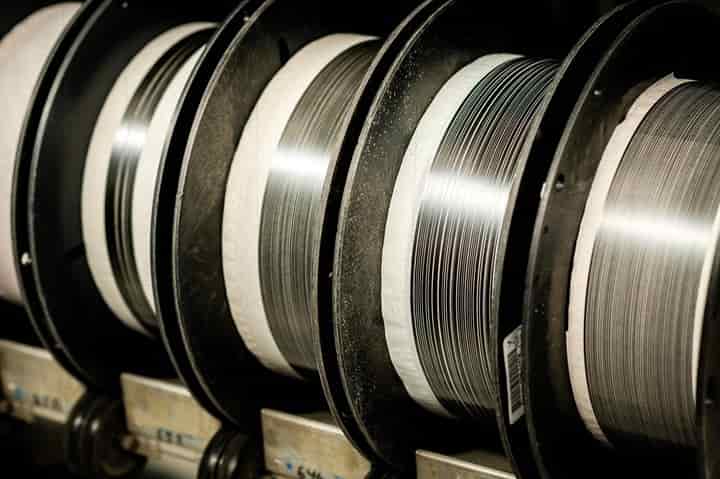
Chemical recycling cost – AI new frontier for PET preforms 12-07-2023
